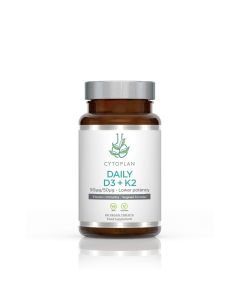Magnesium is an essential mineral and is involved in over 300 metabolic processes, playing an important role in maintaining a variety of areas of health. It is required for effective energy production, supporting cardiovascular and bone health and is necessary for the proper functioning of muscles and normal nerve function. Magnesium works synergistically with calcium to allow muscles to relax, which has given it the title of "nature's tranquiliser". It also helps to promote the absorption of other vitamins and minerals in the body.
Levels of magnesium found in a typical modern UK diet are poor and research estimates that nearly two thirds of the western population are not achieving the recommended levels, making magnesium deficiency widespread. A low intake of wholefoods and an increased intake of processed foods are contributory factors, as are reduced magnesium levels in the soil. Losses tend to increase with the use of diuretics and the consumption of alcohol. Magnesium is also easily depleted from the diet by processing, cooking and refining. Poor gastrointestinal absorption of magnesium can occur because of vitamin D deficiency, another common issue in western cultures. Including a magnesium supplement can therefore provide additional support and safeguard against any nutritional shortfalls.
Within our magnesium supplement range we provide Biofood Magnesium, which is a gentle Food State supplement complete with natural carriers that fit into normal metabolic pathways to ensure recognition, optimal absorption and utilisation in the body. It is the associated components in the complex which are often responsible for the retention and utilisation of the primary nutrient, and this ensures a beneficial metabolic outcome.
Our Magnesium Citrate is the best of the non-food forms of magnesium, providing it in a readily absorbed and bioeffective citrate form. Magnesium Threonate is recommended for those looking to elevate magnesium levels in the brain as it has the unique ability to cross the blood-brain barrier.
All of our magnesium supplements are suitable for vegetarians and vegans and are available as magnesium tablets or magnesium capsules.
What is magnesium?
Is a magnesium deficiency common?
Many people in the UK have low levels of magnesium. In fact, research suggests that as many as two thirds of the population are deficient in this important mineral. This can be due to a variety of factors which include:
- a diet low in magnesium-rich foods such as green vegetables, nuts and seeds
- fizzy drinks - which have been associated with low magnesium levels due to the phosphoric acid content
- a diet high in processed foods, which are poor sources of magnesium
- certain medications
- depleted soil conditions, which means that plants are now lower in magnesium
- a high intake of sugar and caffeine
- chronic stress
- digestive disorders
- processing and cooking
All of the above can deplete magnesium or increase our needs and make meeting our daily requirements challenging. Supplementing with magnesium can therefore provide additional support and safeguard against any nutritional shortfalls.
What is magnesium good for?
Magnesium supports a variety of functions within the body and contributes to:
- a reduction of tiredness and fatigue
- electrolyte balance
- normal energy-yielding metabolism
- normal functioning of the nervous system
- normal muscle function
- normal protein synthesis
- normal psychological function
- the maintenance of normal bones
- the maintenance of normal teeth
What are the different types of magnesium supplements available?
Magnesium supplements are available in a variety of different forms to suit age, indications and individual preference.
Food State Magnesium is effectively an organic matrix form of magnesium complete with amino acid carriers to ensure transport to sites of need within the body. This ensures it is recognisable by the body and optimally utilised. It is the associated components in the complex which are often responsible for the retention and utilisation of the primary nutrient, and this ensures a beneficial metabolic outcome.
Magnesium Citrate – is the best of the non-food forms of magnesium and provides magnesium in an absorbable citrate form. As a citrate, it is readily absorbed into the bloodstream and increases levels rapidly.
Magnesium Threonate is recommended for those looking to elevate magnesium levels in the brain as it has the unique ability to cross the blood-brain barrier.
What are the best food sources of magnesium?
A diet abundant in fresh fruit, vegetables, nuts, seeds and wholegrains will help to provide adequate magnesium in the diet. In general, foods containing dietary fibre provide magnesium.
The following foods are also good sources:
- Avocados
- Fish and other seafood
- Legumes (beans and lentils)
- Dark chocolate









